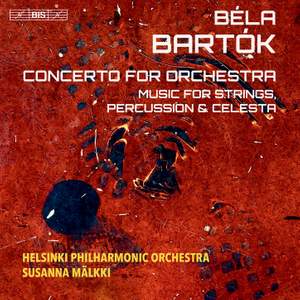Susanna Mälkki setzt in ihrer Interpretation der Musik für Streicher, Schlagzeug und Celesta auf Transparenz und schafft im ersten und im dritten Satz eine vergeistigt-mysteriöse Atmosphäre. Eine markante, Solti-eckige Rhythmik mit satten Bässen prägt die beiden schnellen Sätze dieser insgesamt sehr spannenden Aufnahme.
Viel weniger überzeugend ist die Interpretation des Konzerts für Orchesters, die zwar sehr detailreich und punktuell auch sehr gestisch ist, orchestral brillant, aber gestalterisch eher Mainstream. Von der Klangimagination eines Lorin Maazel, der absoluten, schlanken Klarheit bei Karajan, der packenden Rhythmik von Georg Solti, dem magischen Dirigat Eschenbachs (Philadelphia) oder der schaurigen, hoch expressiven Deutung von Zoltan Kocsis sind wir weit entfernt. Über weite Strecken ist diese Aufnahme bloß langweilig. Mithin ist dies die schwächste von Mälkkis bisherigen Bartok-Einspielungen.
Susanna Mälkki’s interpretation of the Music for strings, percussion and celesta focuses on transparency and creates a spiritual-mysterious atmosphere in the first and third movements. A striking, Solti-esque rhythm with rich basses characterizes the two fast movements of this altogether very exciting recording.
Much less convincing is the interpretation of the Concerto for Orchestra, which is indeed very rich in detail and at points also very gestural, orchestrally brilliant, but otherwise rather mainstream. We are far from the imagination of a Lorin Maazel, the absolute, lean clarity of Karajan, the gripping rhythm of Georg Solti, the magical conducting of Eschenbach (Philadelphia), or the eerie, highly expressive interpretation of Zoltan Kocsis. Too often this performance is merely boring. Consequently, this is the weakest of Mälkki’s Bartok recordings to date.
https://www.pizzicato.lu/viel-farbe-fur-blaubart/




















